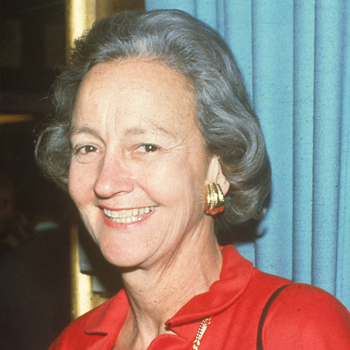One of America’s most famous and admired media figures, Katharine Graham was born June 16, 1917, in New York. She took over the family newspaper, The Washington Post, after the suicide of her husband, Phil Graham, in 1963. At the time, she was a shy and insecure woman with almost no prior training, but within a few years she had built the Washington Post Company into one of the country’s most respected media organisations, comprising not only the flagship Post and Newsweek magazines, but also several other newspapers, television stations and cable television systems.
She wrote about this transformation with extraordinary candour in her memoir, Personal History, which received the 1998 Pulitzer Prize for biography. In 1979, Graham passed the job of publisher on to her son, Donald, but continued to actively participate in journalism. She is currently chair of the executive committee of the Washington Post Company and co-chairs the International Herald Tribune.
Legendary for her courage in defending press freedom, Graham took a courageous stand when The Post published excerpts of the secret Pentagon Papers, which detailed government deception concerning U.S. policy in the Vietnam War. After a federal judge stopped The New York Times from publishing the Pentagon Papers, Graham’s executive editor, Ben Bradlee, urged her to publish them. Graham told Bradlee to go ahead, against the advice of her lawyers and despite being enjoined by the U.S. Justice Department. The Supreme Court of the United States later ruled in favour of The Post, a ruling that was considered a major victory for press freedom.
Graham was publisher of The Post during the Watergate scandal in the early 1970s, when two young Post reporters, Bob Woodward and Carl Bernstein, broke the story that would lead to the first resignation of a United States president and the criminal conviction of several members of his administration. Graham persisted in supporting Post reporters’ investigations of illegal acts of President Richard Nixon’s White House, despite the administration’s threats of retaliation against her paper. “The Post is going to have damnable, damnable problems out of this one,” Nixon said. “They have a television station … and they’re going to have to get it [their license] renewed.” The United States Attorney General, John Mitchell, famously threatened that “Katie Graham’s gonna get her tit caught in a big fat wringer.”
“The pressures on The Post to cease and desist were intense,” Graham wrote in her memoir. “Readers, too, were writing to me, accusing The Post of ulterior motives, bad journalism, lack of patriotism.” Among the worst effects was the sharp decline in The Post’s stock price, which decreased the value of the company by more than half. Eventually, however, the newspaper won a Pulitzer Prize for meritorious service for its Watergate reporting, Graham became chairwoman of the board and chief executive officer of the company in May 1973, and Richard Nixon was forced to resign in order to avoid impeachment in August 1974.
“Watergate, no doubt, was the most important occurrence in my working life, but my involvement was basically peripheral, rarely direct,” Graham wrote with characteristic understatement. “For the most part I was behind the scenes. I was a kind of devil’s advocate, asking questions all along the way – questions about whether we were being fair, factual and accurate.”
For her dedication to the principles of press freedom, Graham received the Zenger Award for Freedom of the Press and the People’s Right to Know in 1973 and the Burton Benjamin Memorial Award from the Committee to Protect Journalists in 1992.
Katharine Graham died in hospital on July 17, 2001 aged 84 after sustaining head injuries in a fall while visiting Sun Valley, Idaho.
*From our Archive – Speech on behalf of 50 World Press Freedom Heroes at IPI World Congress in Boston (Congress Report)



